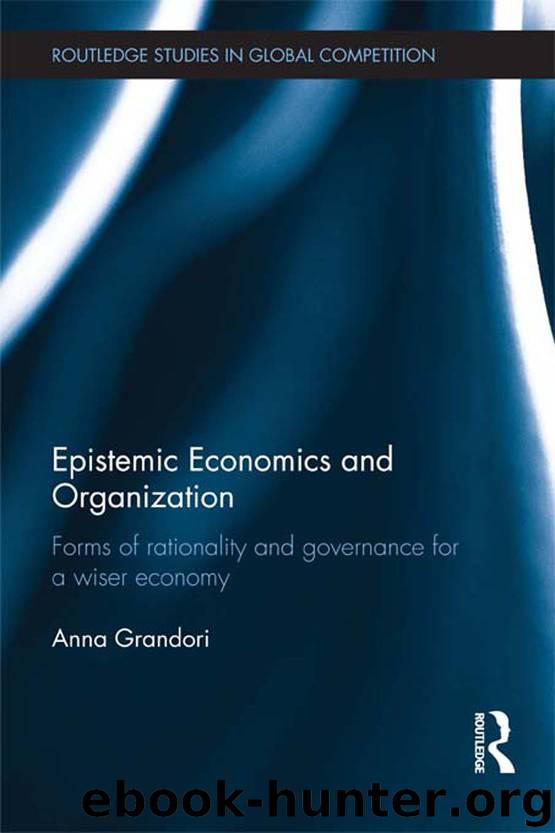Epistemic Economics and Organization by Grandori Anna

Author:Grandori, Anna.
Language: eng
Format: epub
Publisher: Taylor & Francis (CAM)
6 Summary
Part II of this book proposes an epistemic re-foundation of contracts using a wide range of contributions from OE, OT and L&E. It provides a new solution to contracting under uncertainty, rooted in rational discovery, rather than (only) in saving the cost of writing and enforcing contracts (with or without bounded rationality). In particular, it is maintained that effective and efficient contracts under Knightian or epistemic uncertainty need not be ‘incomplete’ but can be ‘rationally undetermined’ as to the terms of exchange (actions and contingencies), if they specify, instead, a ‘society’ among identifiable parties, endowed with a ‘constitution’ allocating decision right and specifying decision procedures.
A distinctive methodological aspect of this reconstruction is that the need for such a type of contract is derived from the need for contracting under uncertainty; it is not a post hoc rationalization of what on average firms or any other empirical arrangements look like. A contract on resource commitments rather than on actions and contingencies, rooted in an action discovery, and in a ‘resource in search of use’ decision logic, allows the discovery of action and the adaptation to changing and new circumstances, while protecting parties from the possible conflicts that can arise along the way. It is viable where exchange contracts (or nexuses of them thereof) fail.
The result is an explanation of firm-like organization, or, more precisely a rational reconstruction of why firm-like organization may be necessary, with the following, arguably desirable, features (cf. Demsetz 1991; Egidi 1997; Langlois 2007): (1) it explains the existence of the firm independently from the particular proprietary and organizational regime governing it (i.e. ‘capitalistic’, ‘entrepreneurial’ or ‘collective’) – as it should be, as all of them are particular types of firm; (2) it highlights the continuity and fungibility between firms and other types of ‘firm-like’ property right-based ‘societas’ that are in fact a usable and used structural alternative in the regulation complex transactions (like joint ventures and consortia); (3) it relocates all those forms of ‘societas’ within the constitutional context of democratic societies, whereby firms, as any other legally recognized association, should comply with the basic principles of democracy; (4) it includes different types of firms as particular cases: formally, depending on ‘who are the principals’ in the democracy; functionally, as the different functions of ‘identity establishing and knowledge sharing’, pooling ‘unique, firm-specific resources’, and ‘reducing the costs of specific and uncertain transactions’ may be present to a varying extent – as it should be, as there are plenty of firms that are not characterized by high asset specificity nor by high knowledge sharing or high identification.
Ten theses are advanced on the nature of the firm, revisited as an epistemically and instrumentally rational device. They state that one core general reason for establishing a firm is ‘epistemic’: not being able to predict ex ante the best uses of a set of resources, or, more precisely, combining and committing resources to the discovery of their possible uses. A second core reason is ‘social’ as based on ‘responsibility’: defining
Download
This site does not store any files on its server. We only index and link to content provided by other sites. Please contact the content providers to delete copyright contents if any and email us, we'll remove relevant links or contents immediately.
International Integration of the Brazilian Economy by Elias C. Grivoyannis(111059)
The Radium Girls by Kate Moore(12028)
Turbulence by E. J. Noyes(8049)
Nudge - Improving Decisions about Health, Wealth, and Happiness by Thaler Sunstein(7706)
The Black Swan by Nassim Nicholas Taleb(7129)
Rich Dad Poor Dad by Robert T. Kiyosaki(6632)
Pioneering Portfolio Management by David F. Swensen(6300)
Man-made Catastrophes and Risk Information Concealment by Dmitry Chernov & Didier Sornette(6019)
Zero to One by Peter Thiel(5801)
Secrecy World by Jake Bernstein(4753)
Millionaire: The Philanderer, Gambler, and Duelist Who Invented Modern Finance by Janet Gleeson(4478)
The Age of Surveillance Capitalism by Shoshana Zuboff(4292)
Skin in the Game by Nassim Nicholas Taleb(4248)
The Money Culture by Michael Lewis(4207)
Bullshit Jobs by David Graeber(4190)
Skin in the Game: Hidden Asymmetries in Daily Life by Nassim Nicholas Taleb(4006)
The Dhandho Investor by Mohnish Pabrai(3764)
The Wisdom of Finance by Mihir Desai(3746)
Blockchain Basics by Daniel Drescher(3582)
